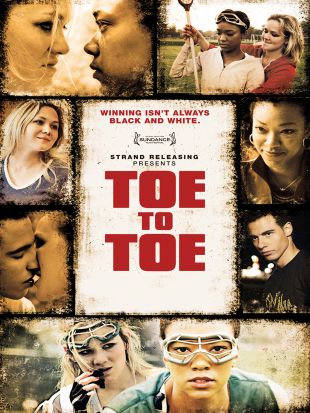The Sundance Film Festival succès d'estime Toe to Toe, American writer-director Emily Abt's sophomore feature, is a partly successful coming-of-age drama with some glowing elements and not a few crippling disappointments. The outing dramatizes the shifting social dynamic between two teenage girls (twentysomething ingenues Louisa Krause and Sonequa Martin) in their final year at an exclusive preparatory school in Washington, D.C. Wealthy, WASPish blonde Jesse (Krause) recoils from a miserable home life and a careless, absentee executive mother (Ally Walker) with constant acts of rebellion, characterized by substance abuse and sex without connection. Meanwhile, African-American teen Tosha (Martin) -- emerging from a financially challenged family in a lower-middle-class neighborhood -- pours her heart and soul into academics, determined to rise above circumstances by winning a scholarship to Princeton. The two girls meet on the lacrosse team and forge a tentative friendship; while Jesse sinks deeper and deeper into hopeless, antisocial acts, Tosha struggles to keep her grades up, awaiting news from the Ivy League.
Unfortunately, Abt not only fails to establish a logical basis for the bond between two radically different young women, but builds their characters in such a way that the central friendship fails to compute. As the director-scribe sets up the character of Tosha, we witness her aggressively rejecting dysfunctional elements of her familial background -- particularly her brother's stoned-out imperviousness to daily responsibility (so extreme that he accidentally puts a small child's safety at stake while high) and her police officer mother's hesitancy to crack down on the brother's behavior. Tosha also seems inclined to reject any options for her future that qualify as less than ideal -- epitomized by her insistence on admission to Princeton. If all of this is true, and because she has obviously worked so hard to get to where she is, wouldn't she automatically feel indignant about a wealthy, slightly arrogant classmate who is handed material benefits, financial security, and prep school admission on a silver platter, yet throws it away on dead-end, delinquent behavior? Tosha's immediate reactions to Jesse's treatment of her don't add up either; when Jesse betrays her in a significant, hurtful way, and then tosses it off with a casual admission (an act with ramifications that do eventually separate the girls), it barely seems to register with Tosha.
Therein lies the film's greatest flaw: the friendship between Jesse and Tosha feels like a story construction, a convenient narrative conceit that just doesn't ring true. Abt may have realized this at some point in the scriptwriting phase, for the film eventually seems to be intercutting two very different accounts with only the most tangential narrative and thematic connections.
Taken on an individual level, however, the substories have more merit. Best (by a long shot) is the account of Tosha. We've seen numerous chronicles in prior films of African-American teens from less-than-ideal circumstances who determine to rise above and build secure lives for themselves at all costs -- John Singleton's masterpiece Boyz 'n the Hood, for one, immediately comes to mind. Toe to Toe offers one of the best, thanks largely to Martin's finely felt, emotionally overpowering portrayal; she climbs into the role with every ounce of earnestness that she possesses, and makes Tosha her own. Abt also sets up Tosha's family life in a coherent and intelligent way -- with the iconic Leslie Uggams as Tosha's compassionate, radiantly sane live-in grandmother, we understand immediately where Tosha's well-grounded self-determinism originated, and can tie it to the presence of the grandmother as a rock-solid adult role model.
Krause also delivers a thoroughly convincing portrayal, but her arc grows deadeningly monotonous, and eventually loses the audience. We can only take so many sequences of Jesse compromising herself in a battery of ways before writing this character off as an indie-film stereotype -- the poor, misunderstood, spoiled-rotten rich girl from a broken home. On a couple of brief occasions, the film's treatment of Jesse turns so gratuitous that it becomes truly irresponsible, as when the director cuts to a close-up of her face seconds after an implied sexual act with a lover. Fortunately, however, the final sequence between Jesse and her mother leads to two scenes of astonishing emotional power and suggests a credible turning point for the young woman -- doing much, in the process, to bounce back from repetition and poor directorial choices that initially characterized earlier depictions of Jesse's life and behavior.
In the final analysis, the film feels wildly uneven, but curiously, its greatest strengths may exist well outside of the drama, on a documentary level. Situated and filmed on location in the "Go-Go" region of Washington, D.C., it depicts a sociological quilt of residents from a broad swath of ethnic backgrounds co-mingling with little racial friction evident. This suggests that it could have been even more compelling for Abt to forego her semi-clichéd dramatic constructions and shoot a cinéma direct documentary about contemporary teens maturing in this fascinating environment.
